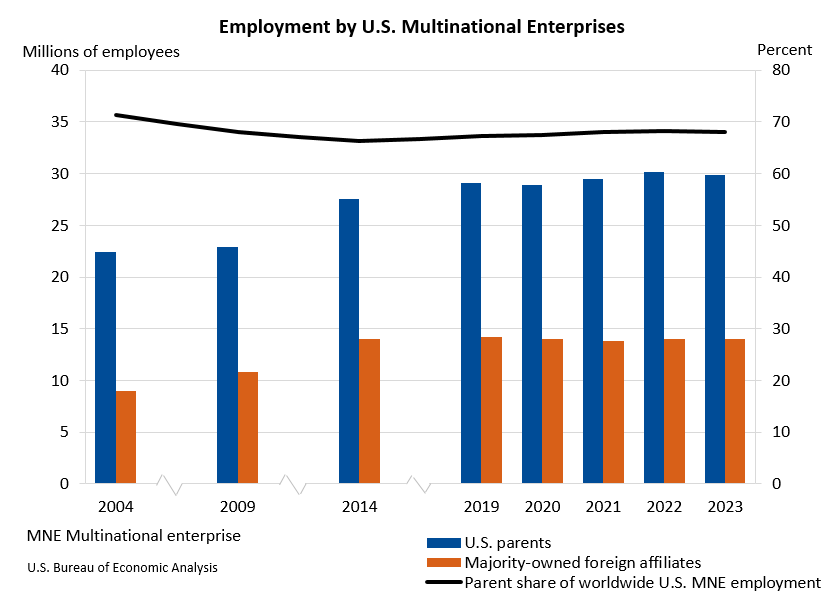Bureau of Economic Analysis
Activities of U.S. Multinational Enterprises, 2023
Worldwide employment by U.S. multinational enterprises decreased 0.4 percent to 43.9 million workers in 2023 (preliminary) from 44.1 million workers in 2022 (revised), according to statistics released today by the U.S. Bureau of Economic Analysis on the operations and finances of U.S. parent companies and their foreign affiliates.
Principal Federal Economic Indicators
Noteworthy
- 2025 News Release Schedule
- Innovation at BEA
- 2025 Annual Updates
- Distribution of Personal Income Nowcast
- New! Services Trade Data for More Countries
- Data Tool: Trade in Value Added
- Updated: RIMS II Regional Multipliers
- Arts and Culture
- Space Economy
- FDI Now in State BEARFACTS
- Quick Guide: Price Indexes
The Latest
June 2024 Trade Gap is $73.1 Billion
The U.S. goods and services trade deficit decreased from $75.0 billion in May (revised) to $73.1 billion in June, as exports increased more than imports. The goods deficit decreased $2.5 billion to $97.4 billion, and the services surplus decreased $0.6 billion to $24.2 billion.
U.S. International Trade in Goods and Services, June 2024
The U.S. goods and services trade deficit decreased in June 2024 according to the U.S. Bureau of Economic Analysis and the U.S. Census Bureau. The deficit decreased from $75.0 billion in May (revised) to $73.1 billion in June, as exports increased more than imports. The goods deficit decreased $2.5 billion in June to $97.4 billion. The services surplus decreased $0.6 billion in June to $24.2 billion.
BEA: Taking Economic Statistics Personally Since 1938
A blog from BEA Director Vipin Arora
When I hear the phrase “personal income,” I think about my paycheck. When we talk about personal income in the context of BEA’s economic statistics, however, it’s my paycheck, your paycheck, your cousin’s paycheck—and much more. In fact, I believe our monthly personal income statistics are the most comprehensive measure of U.S. economic activity available on a monthly basis. They are also a widely…
Producto interior bruto para Puerto Rico, 2022
El producto interior bruto real (PIB) para Puerto Rico decreció 2.5 por ciento en 2022, luego de crecer 4.1 por ciento en 2021, de acuerdo con las estadísticas difundidas hoy por el Negociado de Análisis Económico de EE. UU. (BEA por sus siglas en inglés). El decrecimiento en el PIB real en 2022 reflejó un aumento en las importaciones —que son un elemento de resta en el cálculo del PIB— así como decrecimientos en la inversión privada en…
Gross Domestic Product for Puerto Rico, 2022
Real gross domestic product (GDP) for Puerto Rico decreased 2.5 percent in 2022 after increasing 4.1 percent in 2021, according to statistics released today by the U.S. Bureau of Economic Analysis
The decrease in real GDP in 2022 reflected an increase in imports—which are a subtraction item in the calculation of GDP—as well as decreases in private fixed investment and exports. Personal consumption expenditures, private inventory…
Producto interior bruto para Puerto Rico, 2022
El producto interior bruto real (PIB) para Puerto Rico decreció 2.5 por ciento en 2022, luego de crecer 4.1 por ciento en 2021. El decrecimiento en el PIB real en 2022 reflejó un aumento en las importaciones —que son un elemento de resta en el cálculo del PIB— así como decrecimientos en la inversión privada en capital fijo y en las exportaciones. Los gastos de consumo personal, la inversión privada en inventarios, y los gastos de gobierno…
Gross Domestic Product for Puerto Rico, 2022
Real gross domestic product (GDP) for Puerto Rico decreased 2.5 percent in 2022 after increasing 4.1 percent in 2021. The decrease in real GDP in 2022 reflected an increase in imports—which are a subtraction item in the calculation of GDP—as well as decreases in private fixed investment and exports. Personal consumption expenditures, private inventory investment, and government spending increased.
Personal Income and Outlays, June 2024
Personal income increased $50.4 billion (0.2 percent at a monthly rate) in June. Disposable personal income (DPI)—personal income less personal current taxes—increased $37.7 billion (0.2 percent). Personal outlays—the sum of personal consumption expenditures, personal interest payments, and personal current transfer payments—increased $59.3 billion (0.3 percent) and consumer spending increased $57.6 billion (0.3 percent). Personal saving was…
Personal Income and Outlays, June 2024
Personal income increased $50.4 billion (0.2 percent at a monthly rate) in June. Disposable personal income (DPI)—personal income less personal current taxes—increased $37.7 billion (0.2 percent). Personal outlays—the sum of personal consumption expenditures (PCE), personal interest payments, and personal current transfer payments—increased $59.3 billion (0.3 percent) and consumer spending increased $57.6 billion (0.3 percent). Personal saving…
Gross Domestic Product, Second Quarter 2024 (Advance)
Real gross domestic product (GDP) increased at an annual rate of 2.8 percent in the second quarter of 2024, according to the “advance” estimate. In the first quarter, real GDP increased 1.4 percent. The increase in the second quarter primarily reflected increases in consumer spending, inventory investment, and business investment. Imports, which are a subtraction in the calculation of GDP, increased.




